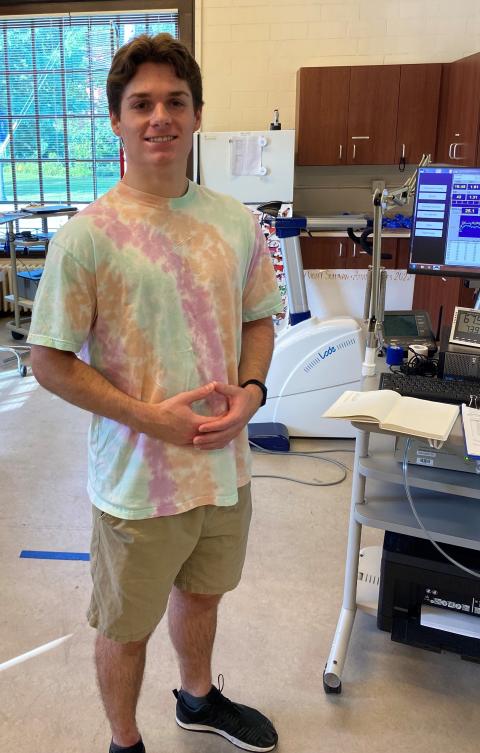Research Spotlight: Cool Solutions to a Hot Problem

As summer temperatures soar, exercising becomes more challenging. But could the heat be affecting more than just motivation? UNH exercise science student Jack Souza '25 is investigating a potential link between rising global temperatures and obesity rates.
"Although they're not causational, the correlation should be recognized," Souza says. "In the heat, you actually expend less energy. So that may be one of the reasons why we're seeing an increased prevalence in obesity."
A Potential Chilly Solution?
With help from the McNair Scholars Program, Souza's "Cool Solutions to a Hot Problem" research project investigates whether cold exposure during exercise could increase energy expenditure and potentially help decrease obesity rates.
“There's a lot of research that says that at rest, you burn more energy in the cold, which makes sense because your body must shiver to warm up, but it's understudied during exercise,” Souza explains.
Research Method: Chill Out and Pedal
To test his hypothesis, Souza is recruiting participants for a unique exercise experience. After a baseline cardiorespiratory fitness test, participants spend three consecutive days in each temperature setting (room temperature and cold, 39 degrees) for 20-minute cycling sessions.
These sessions occur at the Kertzer Exercise Physiology Laboratory, with a 3–5-day break between switching temperature settings.
Throughout the process, Souza measures 24-hour glucose control and energy expenditure in different temperature settings.
Reimagining the Gym Experience?
Souza is working with his advisor, Michael Brian, assistant professor of kinesiology, and will continue collecting data in the fall. He hopes to present his findings at research conferences during the upcoming academic year.
Suppose his findings strongly link cold temperatures and better exercise performance? In that case, Souza envisions potential applications: "It may not be the most feasible option in terms of practicality, but maybe commercial gyms could start including an environmental chamber. People could exercise in the cold, expend more energy, and that could help with the prevalence of obesity in America."
Whatever the results, Souza hopes to start a conversation or spur additional research.
A Career in Exercise Science Research
Research will play an essential role in Souza's future. He plans to pursue a master's degree and Ph.D., aiming for a research-oriented career in exercise science.
"I originally wanted to be a strength and conditioning coach, but as I've been exposed to the research that happens here at UNH, I've definitely latched onto it and found it really interesting to understand the deeper physiological mechanisms behind the adaptations to exercise," he says.